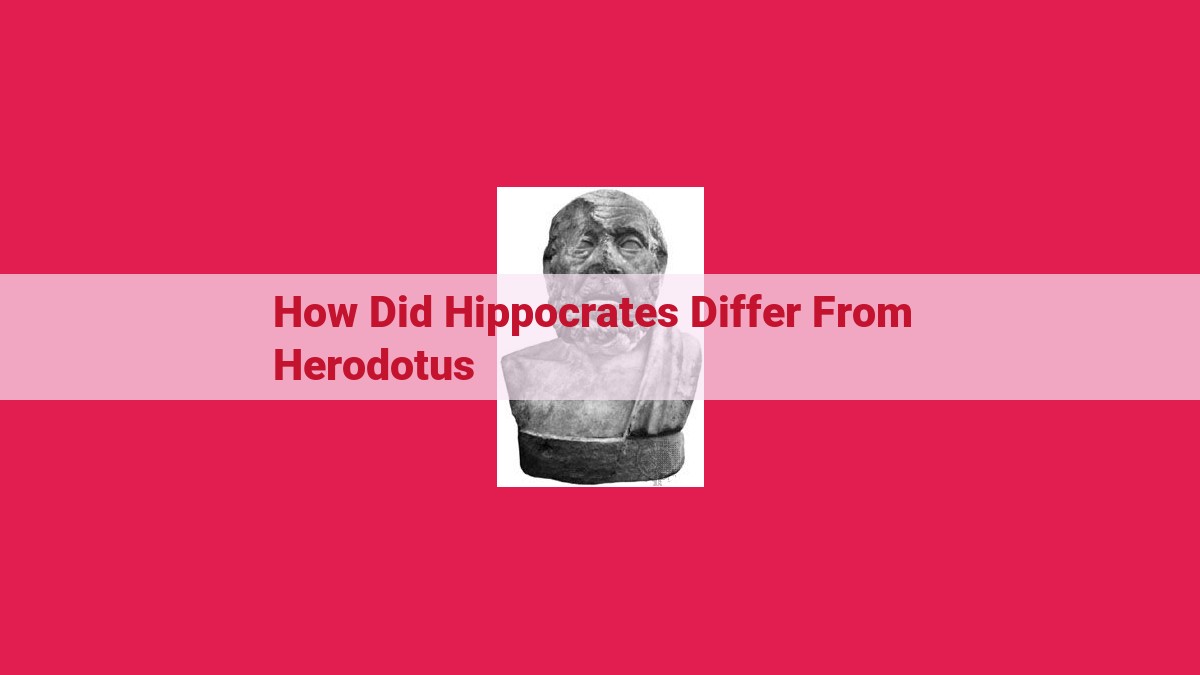Hippocrates Vs. Herodotus: Pioneers Of Medicine And History

Hippocrates and Herodotus, both influential figures of antiquity, differed markedly in their areas of focus. Hippocrates dedicated himself to medicine, emphasizing observation and empiricism, while Herodotus concentrated on history and culture, relying on eyewitness accounts and oral traditions. These differences in focus shaped their methodologies and left lasting impacts on their respective fields, with Hippocrates becoming known as the “father of medicine” and Herodotus as the “father of history.”
Hippocrates: The Pioneering Physician
Introduction:
Hippocrates, a Greek physician known as the “Father of Medicine,” revolutionized the field of medicine with his emphasis on rationalism and empiricism. This legendary figure laid the foundation for modern medical practices and ethical principles that continue to shape healthcare today.
Focus on Medicine and the Human Body:
Hippocrates believed that illness stemmed from natural causes, not supernatural forces. He focused on observing symptoms, collecting data, and studying the human body to understand and treat diseases. Hippocrates recognized the importance of diagnosis through physical examination and pioneered the practice of prognosis.
Methodology:
Hippocrates advocated for a scientific approach to medicine. He believed in observation, experimentation, and data collection. His approach involved carefully recording patients’ symptoms, medical history, and treatment outcomes. This systematic approach allowed him to identify patterns and develop evidence-based treatments.
Emphasis on Observation and Data Collection:
Hippocrates’ emphasis on clinical observations and medical records was groundbreaking. He meticulously documented patients’ symptoms, diets, and responses to treatments, establishing a foundation for evidence-based medicine. These observations played a crucial role in developing his theory of humors, which influenced medical thought for centuries.
Influence on Western Thought:
Hippocrates’ contributions had a profound impact on Western thought. His rational approach to medicine challenged prevailing superstitions and established the scientific method as a cornerstone of medical practice. He emphasized the importance of education and professionalism within the medical community, which contributed to the standardization and advancement of medical knowledge.
Legacy:
Hippocrates’ legacy extends far beyond his time. The Hippocratic Oath, attributed to him, is a guiding principle for medical ethics, outlining the responsibilities and obligations of physicians towards their patients. His focus on scientific inquiry laid the groundwork for modern medicine, while his humanistic approach to patient care remains an essential aspect of the medical profession. Hippocrates’ contributions have had an indelible impact on our understanding of health, disease, and the art of healing.
The Pioneering Insights of Hippocrates: The Father of Medicine
In the annals of history, the name Hippocrates looms large as the founding father of Western medicine. His unwavering pursuit of knowledge and his systematic approach transformed our understanding of the human body and health.
Hippocrates believed that medicine should be based on observation and data, not superstition or guesswork. He meticulously recorded his patients’ symptoms, treatments, and outcomes, laying the groundwork for the scientific method.
His focus on the human body was revolutionary. Hippocrates believed that the body was a complex and interconnected system, and that its imbalances could lead to illness. He observed patients, examined their organs, and developed treatments tailored to each individual.
Hippocrates’ emphasis on health extended beyond physical well-being. He recognized the importance of mental and emotional health, advocating for a holistic approach to healing. His famous Hippocratic Oath embodies these principles and serves as a guiding light for medical professionals even today.
Herodotus: The “Father of History” and Explorer of Cultures
Herodotus, a renowned Greek historian and traveler, emerged as a pivotal figure in Western historiography. Captivated by the rich tapestry of history, geography, and culture, he embarked on extensive journeys to unravel the world’s secrets and document its diverse narratives.
Focus on History and Culture
Herodotus’s primary focus was chronicling the history of the ancient world. He meticulously compiled accounts of major events, such as the Persian Wars, and explored the origins, customs, and beliefs of various civilizations. His work, titled “The Histories”, became an invaluable source of information about the ancient Greeks, Persians, Egyptians, Babylonians, and Scythians.
Geographic Explorations
In his travels, Herodotus ventured into uncharted territories and recorded detailed observations of the geography and topography of the regions he visited. He mapped out the Nile River, described the fertile plains of Mesopotamia, and even explored the mysterious lands of the Scythians. His geographic insights expanded the knowledge of the ancient world and laid the foundation for future explorers.
Methodology
Herodotus employed a rigorous methodology to gather information for his writings. He interviewed eyewitnesses, collected written accounts, and examined visual evidence, such as sculptures and inscriptions. He carefully weighed the credibility of his sources and critically evaluated the information he gathered. This systematic approach set a precedent for historical research and established Herodotus as a trusted and reliable historian.
Legacy
Herodotus’s contributions to Western thought are profound. As the “Father of History”, he laid the foundations of historiography, emphasizing the importance of accuracy, objectivity, and comprehensive research. His work inspired generations of historians and served as a model for historical writing.
Moreover, Herodotus’s preservation of oral traditions and ancient cultures played a crucial role in documenting the richness of human history. His writings have enlightened scholars and laypeople alike, fostering an appreciation for cultural diversity and the interconnectedness of the ancient world.
The Pioneering Minds of Hippocrates and Herodotus: Shaping Western Thought
In the annals of history, two towering figures stand out as the founding fathers of Western science and historiography: Hippocrates, the father of medicine, and Herodotus, the father of history. Their groundbreaking methodologies and enduring influence have left an indelible mark on our understanding of the human body, the world around us, and the tapestry of human civilization.
Herodotus’s Focus on History, Geography, and Culture
Herodotus, a tireless explorer and inquisitive mind, embarked on extensive travels across the vast Persian Empire, known as the “Father of History.” He meticulously recorded observations, interviewed eyewitnesses, and collected written accounts, weaving a rich tapestry of history from the scattered fragments of the past.
His insatiable thirst for knowledge led him to document the customs, traditions, and beliefs of diverse cultures, from the grandeur of Babylon to the exotic ways of Scythian nomads. Herodotus’s “Histories” became a seminal work that established the foundations of historical scholarship, providing insights into the origins of nations, the interplay of empires, and the complexities of human societies.
His meticulous research spanned geography as well, mapping the topography of lands and charting the courses of rivers and seas. Herodotus’s work laid the groundwork for future geographers, enabling them to explore and understand the physical world with greater accuracy.
As the “father of history,” Herodotus shaped our understanding of the past and instilled in us a deep appreciation for cultural diversity. His legacy as a pioneer in historiography continues to inspire scholars and researchers to delve into the annals of time and uncover the hidden stories of the human experience.
Hippocrates: The Father of Medicine and Scientific Pioneer
In the tapestry of Western thought, Hippocrates stands as a towering figure, the founding father of medicine. His groundbreaking approach to observation, experimentation, and data collection revolutionized the understanding of health and disease.
Hippocrates rejected the prevailing belief that illness was a divine punishment or the result of supernatural forces. Instead, he viewed it as a natural phenomenon that could be studied and explained through scientific inquiry. He advocated for careful observation of symptoms, meticulous note-taking, and experimental approaches to identify the causes of diseases.
Hippocrates famously declared, “The art is long, and life is short, the occasion fleeting, experience perilous, and judgment difficult.” This humility and recognition of the challenges inherent in medicine served as a guiding principle for his practice. He emphasized the importance of gathering data from multiple patients, conducting clinical trials, and relying on objective evidence rather than relying solely on tradition or hearsay.
Hippocrates’ meticulous approach to evidence-based medicine laid the foundation for modern scientific methods used in medicine today. His focus on rationalism and empiricism influenced countless generations of physicians and shaped the development of Western medical knowledge.
Through his writings, Hippocrates disseminated his groundbreaking ideas widely. His most famous work, the Hippocratic Oath, is a timeless pledge that embodies the ethical principles of medical practice. It emphasizes the importance of patient confidentiality, respect for life, and the commitment to providing compassionate care.
Hippocrates’ legacy extends far beyond ancient Greece. His scientific approach to medicine continues to inspire and guide physicians around the world. The Hippocratic method, characterized by observation, data collection, and hypothesis testing, remains a cornerstone of modern medical education and practice.
As the father of medicine, Hippocrates left an indelible mark on human history. His unwavering dedication to scientific inquiry and his compassionate care for patients set the stage for the advancement of medicine and the pursuit of a healthier future for humanity.
Hippocrates: The Father of Medicine and Observation
1. Focus of Study
Hippocrates, renowned as the “Father of Western Medicine,” dedicated his life to understanding the human body, health, and disease. His holistic approach recognized the importance of addressing the entire person, not just the symptoms of an illness.
2. Methodology
Hippocrates’ groundbreaking methodology revolutionized medicine. He emphasized the observation of patients’ symptoms, careful experimentation, and meticulous data collection. By studying the natural history of diseases, he sought to identify patterns and develop evidence-based treatments.
3. Observation, Experimentation, and Data Collection
Hippocrates observed patients with meticulous care, meticulously recording their symptoms, medical history, and environmental factors. He conducted controlled experiments to test the efficacy of different treatments, and he carefully collected data from his observations.
Through these methods, Hippocrates established a foundation of medical knowledge that would later become the cornerstone of Western medicine. He emphasized the importance of rationalism and empiricism, beliefs that continue to guide scientific inquiry today.
Herodotus: The Father of History
In the tapestry of knowledge, Herodotus stands as a towering figure, his quill weaving tales that have shaped our understanding of the ancient world. Known as the “Father of History,” Herodotus embarked on an epic journey to document the vast array of cultures, customs, and events that defined his era.
Unveiling the Histories
Herodotus’s method of research was meticulously crafted. He traveled far and wide, interviewing eyewitnesses, gathering written accounts from scribes and priests, and making inferences based on his observations. His meticulous approach to collecting evidence laid the foundation for the discipline of historiography.
The Tapestry of Sources
Herodotus’s writings are a vibrant tapestry of sources. He drew upon oral traditions, which he patiently gathered from storytellers and locals. Written documents, such as inscriptions and scrolls, were also carefully scrutinized. And where written records were lacking, Herodotus employed his keen observational skills to piece together a comprehensive narrative.
The Birth of Historical Scholarship
Herodotus’s legacy extends far beyond the specific events he chronicled. His method of inquiry became the bedrock of historical scholarship. By meticulously examining evidence, interpreting it, and drawing conclusions, Herodotus established a precedent for rigorous historical analysis that remains in practice today.
Preserving Cultural Diversity
Through his journeys, Herodotus captured the rich diversity of cultures that flourished in the ancient world. His writings offer an invaluable glimpse into the customs, beliefs, and aspirations of civilizations both near and far. In preserving these stories, Herodotus has ensured that the voices of the past continue to resonate in the present.
Herodotus: The Father of History
Focus on History, Geography, and Culture:
Herodotus, the esteemed Greek historian, devoted his life to unraveling the tapestry of human history, geography, and culture. He embarked on arduous journeys to distant lands, meticulously gathering accounts from eyewitnesses, and poring over written records with an insatiable thirst for knowledge.
Interviewing Eyewitnesses:
Herodotus’s approach was nothing short of groundbreaking. He sought out firsthand accounts from those who had witnessed history unfold before their very eyes. He listened intently to their stories, carefully weighing their testimonies against each other. This meticulous gathering of oral traditions ensured that even the most elusive fragments of the past were preserved for posterity.
Collecting Written Accounts:
In addition to interviewing eyewitnesses, Herodotus also meticulously gathered written records. He scoured archives, consulted with scholars, and delved into ancient texts. By cross-checking information from diverse sources, he sought to paint an accurate and comprehensive picture of the past.
Making Inferences:
Herodotus’s method was not merely a passive accumulation of data. He possessed an analytical mind that allowed him to draw inferences from the evidence he gathered. He considered the context of historical events, the motivations of individuals, and the interplay of cause and effect. This process of critical thinking enabled him to weave a narrative that was both compelling and insightful.
Herodotus’s Legacy: Shaping Western Historiography
Herodotus’s meticulous approach to historical research laid the foundation for Western historiography. His work inspired generations of historians to adopt rigorous methods and to strive for objectivity. His writings continue to inform our understanding of the ancient world and provide invaluable insights into the human condition.
Hippocrates: The Father of Medicine and His Reliance on Clinical Observations
Hippocrates, the renowned Greek physician, emerged as the towering figure in ancient medicine, laying the foundation for a scientific and rational approach to healthcare. His groundbreaking contributions, rooted in the belief that diseases had natural causes rather than supernatural origins, revolutionized medical practices.
Central to Hippocrates’ methodology was his emphasis on clinical observations and meticulous record-keeping. He meticulously observed patients’ symptoms, conducted physical examinations, and documented their medical histories. Through this systematic approach, he established a vast repository of medical knowledge based on real-world experiences.
Hippocrates believed that understanding the individual patient was paramount. He recognized the importance of considering their unique circumstances, lifestyle, and genetic predispositions in diagnosing and treating their ailments. This holistic perspective marked a significant departure from the prevailing mystical beliefs about illness prevalent at the time.
Hippocrates’ case studies, known as “case histories,” became instrumental in advancing medical understanding. By meticulously recording his observations and treatments, he paved the way for future physicians to learn from the collective wisdom gained through clinical experience. This approach laid the groundwork for the scientific method that continues to guide medical research and practice today.
Hippocrates’ legacy extends far beyond his time. The Hippocratic Oath, attributed to him, has become a cornerstone of medical ethics, emphasizing the principles of patient confidentiality, integrity, and compassion in medical practice. His unwavering commitment to evidence-based medicine and his belief in the healing power of nature set the stage for the development of modern medicine, shaping the way we approach healthcare today.
Hippocrates: Father of Medicine and Evidence-Based Practice
Hippocrates, the revered Greek physician, left an indelible mark on Western medicine. His approach to medicine was groundbreaking, emphasizing observation, experimentation, and data collection. Hippocrates believed in treating the patient as a whole, considering their physical, mental, and environmental factors.
Use of Clinical Observations and Medical Records
Hippocrates meticulously observed his patients, documenting their symptoms, illnesses, and treatments. He compiled these observations into detailed medical records, creating a vast repository of knowledge. These records served as a valuable source of information for himself and subsequent physicians.
Hippocrates’ reliance on clinical observations allowed him to identify patterns in disease progression and treatment outcomes. By observing the course of illness in different patients, he was able to deduce general principles that guided his medical practice.
Moreover, Hippocrates experimented with various treatments, carefully observing their effects on his patients. He believed that the best way to advance medical knowledge was through systematic and rigorous experimentation.
Legacy of Hippocratic Medicine
Hippocrates’ legacy extends far beyond his lifetime. His approach to medicine, based on observation, experimentation, and evidence**, laid the foundation for modern Western medicine. His *clinical observations and medical records paved the way for rationalism and empiricism in medical practice.
The Hippocratic Oath, attributed to Hippocrates, embodies the ethical principles of medical practice. It emphasizes the physician’s duty to act in the best interests of their patients. The oath also underscores the importance of patient confidentiality and professional integrity.
Hippocrates’ emphasis on evidence-based practice has shaped the way medicine is practiced today. The scientific method, rooted in observation, experimentation, and data analysis, is the cornerstone of modern medical research and innovation. Hippocrates’ legacy continues to inspire physicians to uphold the highest standards of patient care and advance medical knowledge through rigorous scientific inquiry.
Herodotus: The Father of History and His Use of Evidence
Herodotus, the revered historian of ancient Greece, revolutionized the study of history with his methodical approach to collecting and analyzing evidence. Unlike his predecessors who relied heavily on myth and hearsay, Herodotus embarked on extensive travels, interviewing eyewitnesses, examining written records, and studying visual artifacts to construct a comprehensive account of the world as he knew it.
Oral Traditions: The Rosetta Stone of the Past
Herodotus understood the importance of oral traditions, passed down through generations, as a valuable source of historical knowledge. He meticulously recorded the stories, legends, and songs of the people he encountered, recognizing that they contained fragments of truth and insights into past events. By carefully listening to and interpreting these narratives, Herodotus was able to piece together a tapestry of history that extended far beyond the written record.
Written Documents: Unlocking the Mysteries of the Past
Herodotus’s curiosity extended to written documents, both official records and private correspondence. He diligently searched for inscriptions on monuments, treaties between nations, and personal letters, using them to corroborate and supplement oral accounts. These written sources provided him with a deeper understanding of the political, economic, and social structures of the societies he visited.
Visual Evidence: A Window to the World
Herodotus was also a keen observer of visual evidence, recognizing its power to communicate historical information. He carefully studied architecture, sculptures, and other artifacts, noting their design, scale, and寓意. By examining these physical remains, he gained insights into the artistic talents, religious beliefs, and technological advancements of ancient civilizations.
Weaving the Tapestry of History
Herodotus’s unique approach to collecting and analyzing evidence allowed him to construct a comprehensive and engaging history of the ancient world. By combining oral traditions, written documents, and visual evidence, he created a narrative that transcended mere facts and figures. His work became a seminal text for future historians, establishing the principles of critical inquiry and empirical research that continue to shape the study of history today.
Herodotus: The Father of History and His Methodological Approach
Oral Traditions: The Bedrock of Historical Accounts
Just as Homer immortalized the tales of ancient Greece through epic poetry, Herodotus meticulously gathered and recorded oral traditions recounted by eyewitnesses, storytellers, and travelers. He believed that these living histories, passed down through generations, held invaluable insights into the past. Herodotus’s внимательное внимание to oral accounts allowed him to capture the richness and diversity of ancient cultures, providing a glimpse into their beliefs, customs, and way of life.
Written Documents: Unraveling History’s Enigmas
Herodotus did not limit himself to oral sources alone. He also painstakingly collected and analyzed written documents, including official records, inscriptions, and literary works. These documents served as tangible evidence, corroborating and supplementing the oral traditions he gathered. By scrutinizing these written records, Herodotus sought to uncover the hidden truths and unravel the mysteries of the past, ensuring that his historical accounts were grounded in both oral and written evidence.
Visual Evidence: Capturing History in Vivid Detail
In addition to oral traditions and written documents, Herodotus recognized the importance of visual evidence in reconstructing the past. He внимательно осмотрел monuments, temples, and other physical remains, believing that these structures could provide valuable insights into the culture and history of the people who created them. By incorporating visual evidence into his historical narrative, Herodotus brought ancient civilizations to life, giving his readers a deeper understanding of their architectural achievements, religious practices, and everyday life.
Hippocrates: The Father of Western Medicine
Hippocrates (c. 460-370 BCE), known as the “Father of Western Medicine,” stands as a towering figure in the history of science and medicine. His revolutionary approach to medicine transformed our understanding of disease and laid the foundations for rationalism and empiricism in medical practice.
Hippocrates rejected the prevailing belief that diseases were caused by divine intervention or supernatural forces. Instead, he emphasized the importance of observation, experimentation, and data collection to determine the true causes of ailments. He believed that the human body had an inherent ability to heal itself, and that physicians should focus on facilitating this natural process.
Through careful observation of patients, Hippocrates meticulously recorded their symptoms, treatments, and outcomes. He developed detailed case histories, documenting the progression of diseases and the effectiveness of various remedies. His writings, known as the Hippocratic Corpus, contain a wealth of clinical insights and established the principles of medical ethics.
Hippocrates’ scientific approach revolutionized medicine by shifting the focus from speculation to evidence. He encouraged physicians to rely on their own observations and experience rather than blindly following tradition or dogma. This approach laid the groundwork for the modern scientific method, which has been instrumental in the advancements of medicine and countless other fields.
Hippocrates’ legacy extends beyond his medical contributions. He is credited with the Hippocratic Oath, an ethical code that guides medical professionals to this day. The oath emphasizes the importance of patient confidentiality, integrity, and the pursuit of knowledge. Hippocrates’ insistence on ethical and compassionate patient care has shaped the practice of medicine for millennia.
Hippocrates’ influence on Western medicine cannot be overstated. His emphasis on observation, empiricism, and rationalism paved the way for the development of modern medical science. His teachings continue to inspire physicians worldwide, reminding them of the importance of evidence-based practice, patient-centered care, and the pursuit of scientific knowledge.
Hippocrates and Herodotus: Pioneers of Western Thought
In the annals of human intellectual history, two towering figures stand as founding fathers of Western thought: Hippocrates and Herodotus. These ancient scholars revolutionized their respective fields, leaving an indelible mark on the development of medicine and history.
Hippocrates: The Father of Medicine
Hippocrates, a brilliant Greek physician of the 5th century BCE, is widely regarded as the founding father of Western medicine. His groundbreaking rationalist approach emphasized the importance of observation, experimentation, and data collection. He shifted the focus of medicine from superstition and religious beliefs to scientific inquiry, laying the foundation for the scientific method.
Hippocrates’ writings, such as the Hippocratic Oath, set ethical standards for medical practitioners that are still revered today. His emphasis on empiricism and rationalism transformed the practice of medicine, leading to significant advancements in diagnosis, treatment, and patient care.
Herodotus: The Father of History
Herodotus, another eminent Greek scholar of the 5th century BCE, is known as the father of history. His monumental work, the “Histories”, is a pioneering account of the Greco-Persian Wars and provides invaluable insights into the cultures, geographies, and histories of ancient civilizations.
Herodotus’ methodology involved meticulous research through interviews with eyewitnesses, collection of written accounts, and inferences. He sought to present a comprehensive and objective narrative of historical events, emphasizing cultural diversity and cross-cultural exchange.
Impact on Western Thought
Hippocrates and Herodotus’ contributions had a profound impact on Western thought. Hippocrates’ rationalist and empirical approach laid the groundwork for modern scientific medicine, while Herodotus’ historical scholarship established the foundations of Western historiography.
Their writings influenced countless scholars, thinkers, and practitioners throughout the ages, shaping the way we understand the human body, health, history, and the human experience. Their legacies continue to inspire and inform our pursuit of knowledge and understanding in these fields.
Herodotus: The Father of History
Herodotus, an ancient Greek historian, has long been revered as the “father of history”. His writings, known as The Histories, represent a monumental undertaking that laid the foundations for the discipline of historiography. Through his meticulous research and comprehensive account of the known world, Herodotus played a pivotal role in shaping Western thought and our understanding of ancient cultures.
Rise of Historiography
Before Herodotus, historical accounts were largely based on myths and legends. However, Herodotus approached history with a scientific rigor that set him apart from his contemporaries. He traveled extensively, interviewing eyewitnesses, collecting written records, and meticulously verifying information. By presenting a chronological narrative and providing meticulous details, Herodotus established a new standard for historical inquiry.
Documenting Cultural Diversity
Herodotus’s Histories is a vast tapestry that spans continents and civilizations. He chronicled the rise and fall of empires, the customs and beliefs of distant peoples, and the intricate details of their daily lives. By recording the diverse perspectives of countless individuals, Herodotus provided an invaluable anthropological record that has proved invaluable for scholars and historians alike.
Influence on Western Thought
Herodotus’s work had a profound impact on Western thought. His writings influenced philosophers, historians, and writers for centuries to come. His emphasis on rationalism and empiricism challenged traditional beliefs and laid the groundwork for the scientific method. Moreover, his comprehensive account of the unity and diversity of human experience fostered a sense of global interconnectedness.
Legacy: Preservation and Rediscovery
Herodotus’s legacy extends far beyond his own time. The Histories became a foundational text for historical scholarship, inspiring generations of historians to pursue the study of the past with rigor and objectivity. Furthermore, Herodotus played a vital role in preserving oral traditions and ancient cultures that might otherwise have been lost to time. His writings continue to be a source of inspiration and knowledge for scholars and general readers alike, providing a glimpse into the vibrant and multifaceted world of antiquity.
Herodotus: The Father of History and Documentarian of Cultural Heritage
Herodotus of Halicarnassus, the renowned historian of the ancient world, lived from around 484 to 425 BC. He is widely acclaimed as the “father of history” for his meticulous and groundbreaking work, “The Histories.” Through his extensive travels and meticulous research, Herodotus sought to document the rich tapestry of cultures and civilizations that existed in his time.
Herodotus embarked on an ambitious journey across the known world, traversing Persia, Egypt, Mesopotamia, and Greece. He spent years interviewing eyewitnesses, examining written accounts, and personally observing the customs and traditions of different peoples. His methodology was a departure from the mythical and fantastic accounts that often characterized historical narratives at the time. Instead, Herodotus sought to establish an evidence-based understanding of human history.
Herodotus’s work played a pivotal role in the development of historiography, the systematic study of history. He established the practice of using eyewitness testimony, written sources, and archaeological evidence to reconstruct past events. His groundbreaking approach laid the foundation for modern historical scholarship and provided future generations with invaluable insights into the ancient world.
Beyond his meticulous research, Herodotus also served as a cultural anthropologist, documenting the diverse customs, beliefs, and practices of the peoples he encountered. His writings offer a vivid and engaging account of the social, political, and economic conditions of the ancient world. From the grandeur of the Persian Empire to the mysteries of the Egyptian pyramids, Herodotus captured the essence of different cultures and preserved their legacy for posterity.
Herodotus’s contributions to Western thought are immeasurable. His work not only provided a comprehensive record of the ancient world but also set the standards for historical inquiry, critical analysis, and cultural understanding. As the “father of history,” Herodotus shaped our perception of the past and continues to inspire historians and scholars to this day.
Hippocrates: The Father of Medicine and Medical Ethics
Hippocrates, a renowned Greek physician who lived in the 5th century BCE, is universally recognized as the father of Western medicine. His profound influence on the field can still be felt today, particularly through the Hippocratic Oath, a pledge taken by medical professionals that sets forth ethical guidelines for medical practice.
The Hippocratic Oath emphasizes the values of benevolence, beneficence, and non-maleficence. It enjoins physicians to treat their patients with respect and compassion, to ** prioritize their patients’ well-being** above all else, and to avoid causing harm. These principles have shaped the foundation of medical ethics for centuries, ensuring that medical care is provided with integrity and compassion.
Beyond his ethical teachings, Hippocrates also played a pivotal role in advancing the scientific method in medicine. He emphasized the importance of observation, experimentation, and data collection to gain a deeper understanding of the human body and its ailments. By rejecting supernatural and superstitious beliefs, Hippocrates laid the foundation for a rational and empirical approach to medicine.
This scientific approach eventually led to the development of the Hippocratic Corpus, a collection of medical writings attributed to Hippocrates and his followers. This body of work served as a cornerstone of medical knowledge for centuries and continues to influence modern medical practices.
In conclusion, Hippocrates’ legacy as the father of medicine is multifaceted. Through the Hippocratic Oath, he established a firm ethical framework for medical practice. By pioneering the scientific method in medicine, he paved the way for a more objective and evidence-based approach to treating human illness. His teachings continue to guide medical professionals today, ensuring that the practice of medicine remains a noble and compassionate profession.
Hippocrates and the Legacy of Medical Ethics
In the realm of medicine, Hippocrates, the revered Greek physician, left an enduring legacy that transcends time. His profound influence is intertwined with the Hippocratic Oath, a sacred pledge that has guided medical practitioners for centuries.
The Oath: A Commitment to Ethical Conduct
The Hippocratic Oath is a solemn vow that binds physicians to uphold the highest ethical standards in their practice. It emphasizes the sanctity of the patient-physician relationship, the importance of confidentiality, and the duty to heal. Through this oath, doctors pledge to use their knowledge and skills solely for the benefit of their patients, prioritizing their well-being and respecting their autonomy.
Impact on Medical Ethics
The Hippocratic Oath has profoundly shaped the ethical framework of Western medicine. It has instilled in physicians a profound sense of responsibility towards their patients. Its principles have guided countless medical decisions, ensuring that patient needs are always at the forefront of care. The oath has also laid the foundation for modern medical ethics, influencing codes of conduct and professional standards worldwide.
Preserving the Legacy
Today, the Hippocratic Oath continues to be a cornerstone of medical education. Medical students recite the oath as a symbolic commitment to the ethical practice of medicine. Its enduring relevance underscores the timeless importance of ethical conduct in healthcare. The oath serves as a constant reminder that every medical decision should be made with the patient’s well-being as its guiding principle.
By adhering to the Hippocratic Oath, physicians honor the legacy of its namesake and contribute to the maintenance of trust between patients and the medical profession. This ancient oath remains an invaluable guide, ensuring that the practice of medicine is not only about healing but also about preserving the dignity and rights of every patient.
Hippocrates, Herodotus, and the Legacy of Scientific Inquiry
Throughout history, brilliant minds have pushed the boundaries of knowledge, shaping the foundations of Western thought. Two such figures are Hippocrates, the father of medicine, and Herodotus, the father of history. Their methodologies and use of evidence have had a profound impact on our understanding of the world we inhabit.
Hippocrates: The Origins of Scientific Medicine
Hippocrates, born in ancient Greece around 460 BC, revolutionized medicine by emphasizing the importance of observation, experimentation, and data collection. He believed that illness was not a punishment from the gods but rather a natural phenomenon that could be understood and treated through science. By meticulously documenting his patients’ symptoms and treatments, Hippocrates laid the groundwork for the systematic study of medicine.
The Scientific Method in Modern Medicine
Hippocrates’ legacy lives on in the scientific method, the cornerstone of modern medicine. This systematic approach involves formulating a hypothesis, collecting data, and testing the hypothesis through controlled experiments. By adhering to the scientific method, researchers can objectively evaluate the effectiveness of treatments and gain insights into the underlying causes of disease.
The scientific method has enabled countless medical advancements, from the development of vaccines to the discovery of lifesaving drugs. It has also fostered a culture of evidence-based medicine, in which clinical decisions are made on the basis of rigorous research rather than mere tradition or authority.
Herodotus: Documenting the Past, Preserving Human Knowledge
Herodotus, born around 484 BC, is known for his groundbreaking historical work, “The Histories,” which chronicles the Persian Wars and offers a captivating glimpse into the cultures of the ancient world. Herodotus employed a rigorous methodology, interviewing eyewitnesses, consulting written accounts, and making inferences to piece together a comprehensive narrative.
Herodotus’ Impact on Historiography
Herodotus’ methods set a precedent for historical scholarship, emphasizing the importance of verifying sources, cross-referencing information, and presenting multiple perspectives. His work became a model for future historians, helping to establish historiography as a discipline that seeks to objectively record and interpret the past.
The Enduring Legacy of Two Great Minds
Hippocrates and Herodotus, although separated by time and field of study, share a common legacy as pioneers of scientific inquiry. Their methodologies and use of evidence have indelibly shaped our understanding of the human body, the world around us, and the vast tapestry of human history.
Herodotus:
- Highlight the foundation of historical scholarship and the preservation of oral traditions and ancient cultures.
Herodotus: The Father of History
Known as the “Father of History,” Herodotus was a Greek historian who lived in the 5th century BCE. His seminal work, “The Histories,” is a groundbreaking account of the Greco-Persian Wars and the diverse cultures of the ancient world.
Methodology
Herodotus employed a unique method of historical research, relying on:
- Interviews with eyewitnesses: He traveled extensively, collecting oral accounts from participants in the events he described.
- Collection of written accounts: Herodotus consulted official documents, inscriptions, and literary works to corroborate his findings.
- Inferences from observation: He analyzed the geography, climate, and customs of different regions to draw conclusions about their history.
Use of Evidence
Herodotus’s “The Histories” is a rich tapestry of historical evidence, including:
- Oral traditions: He meticulously documented stories passed down through generations, preserving the cultural memory of ancient civilizations.
- Written documents: Herodotus consulted royal archives, temple records, and other written sources to supplement his oral accounts.
- Visual evidence: He included descriptions of monuments, buildings, and artifacts to provide a vivid picture of the ancient world.
Impact on Western Thought
Herodotus’s work had a profound impact on the development of Western thought:
- Historiography: “The Histories” established the foundation of historical scholarship, providing a method for collecting, analyzing, and presenting historical events.
- Cultural diversity: Herodotus’s descriptions of different cultures fostered an understanding and appreciation of the diversity of human civilization.
- Preservation of oral traditions: By recording oral accounts, Herodotus preserved invaluable insights into the beliefs, customs, and values of ancient societies that would otherwise have been lost.
Highlight the foundation of historical scholarship and the preservation of oral traditions and ancient cultures.
Herodotus: Laying the Foundation of Historical Scholarship
In the annals of Western thought, Herodotus stands as a towering figure, renowned as the “Father of History.” His extensive travels throughout the known world and meticulous documentation of his observations and encounters laid the groundwork for modern historical scholarship.
Herodotus’s innovative approach to history involved interviewing eyewitnesses, collecting written accounts, and employing critical analysis to reconstruct past events. He recognized the importance of oral traditions and ancient cultures as valuable sources of historical information, preserving them for posterity.
Preserving Oral Traditions
Oral traditions have played a pivotal role in shaping human history,传递ing tales of pivotal events, cultural beliefs, and the wisdom of previous generations. Herodotus painstakingly documented these traditions, recognizing their significance as a vital connection to the past.
His writings captured the voices of diverse civilizations, immortalizing their stories, customs, and perspectives. In an era before widespread literacy, Herodotus served as a bridge between the spoken word and the written record, preserving the rich tapestry of human experience.
Celebrating Ancient Cultures
Beyond his focus on oral traditions, Herodotus had a deep appreciation for the diversity of ancient cultures. He traveled extensively, visiting Egypt, Persia, Babylonia, and Greece, among other lands.
His curiosity and open-mindedness led him to document the unique customs, religious practices, and societal structures of these civilizations. Through his writings, Herodotus fostered a greater understanding and appreciation for the plurality of human existence.
Legacy of a History Keeper
Herodotus’s legacy as a historian is immeasurable. His methodological approach became the foundation of historical scholarship, emphasizing the importance of evidence, critical analysis, and documentation.
His preservation of oral traditions and ancient cultures enriched our understanding of human history, providing insights into the lives of our ancestors. As we continue to delve into the past, Herodotus’s writings remain an invaluable source of knowledge, inspiring us to explore, understand, and appreciate the diverse tapestry of human civilization.





